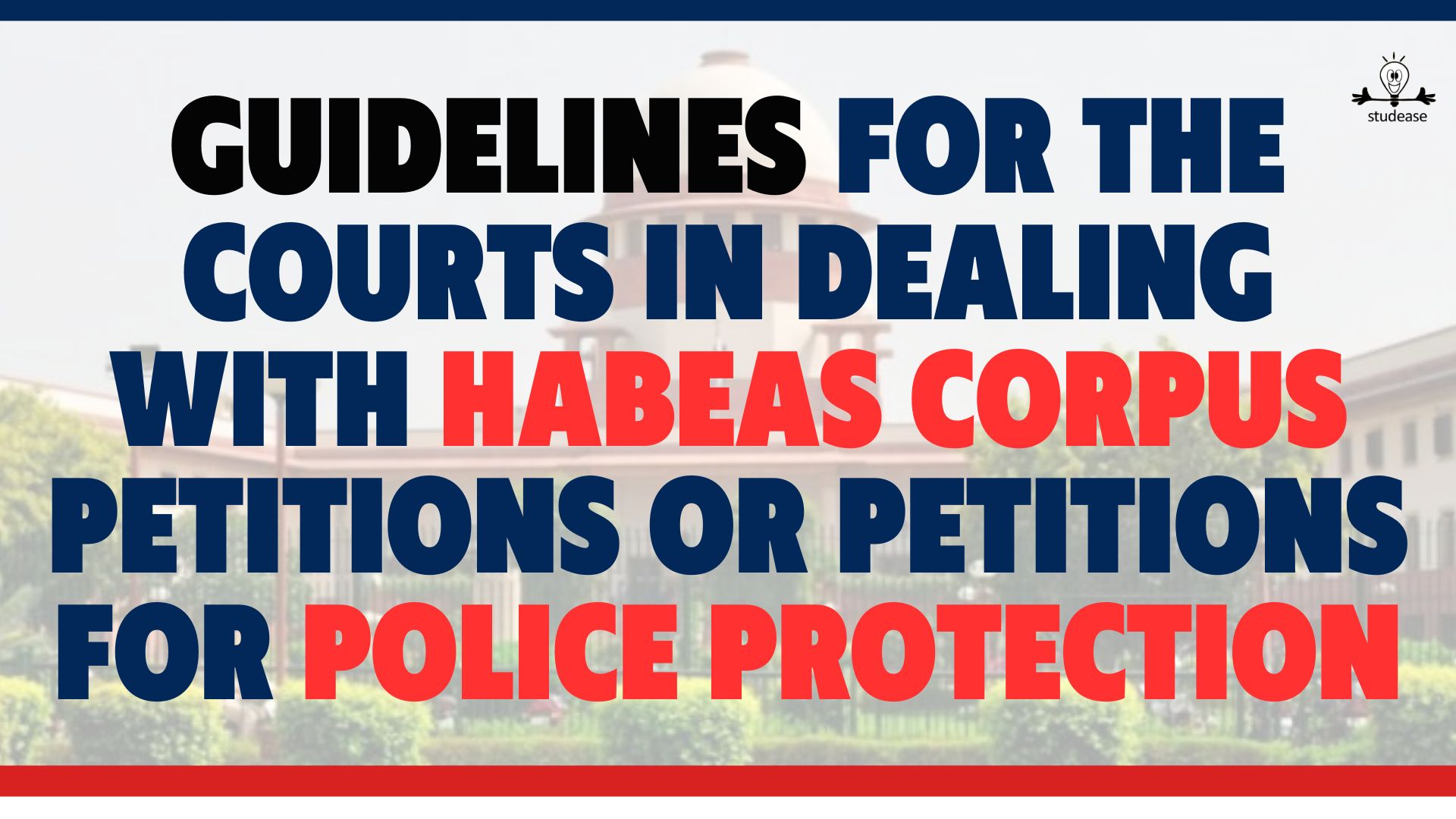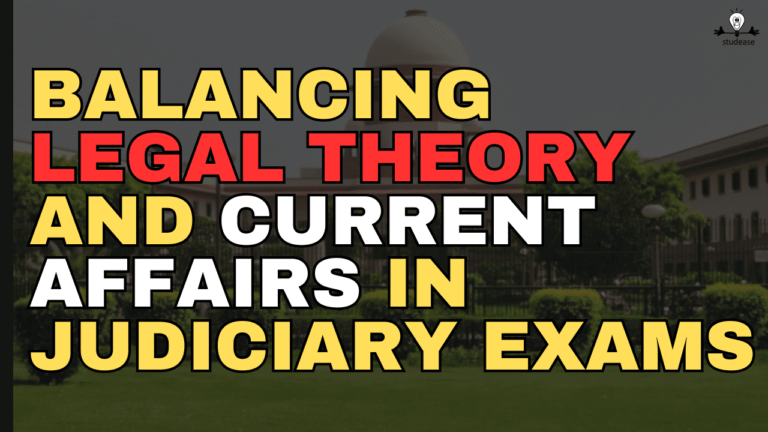Guidelines for the courts in dealing with habeas corpus petitions or petitions for police protection: SC

The Supreme Court has issued important guidelines for the High Courts to follow when handling habeas corpus petitions or petitions requesting police protection in a notable ruling.
Guidelines for the courts in dealing with habeas corpus petitions or petitions for police protection: Supreme Court
Facts of the Case: The appellant and the ‘corpus’ (‘X’ for convenience of reference) are both female. According to the appellant, they were in an intimate relationship. The petition seeking a writ of habeas corpus was instituted on the ground that the ‘X’ was being forcibly kept by her parents in their custody whereas she wished to remain with the appellant.
On 13 January 2023, at the stage of admission, the Kerala High Court ordered the Secretary of the jurisdictional District Legal Services Authority1 to visit the fourth and fifth respondents who are the parents of ‘X’, and record her statement to ascertain if she was under illegal detention. The High Court further directed that in the event that ‘X’ is in illegal detention, the Station Head Officer of the jurisdictional Police Station must ensure that ‘X’ is produced before the Secretary, DLSA to facilitate an interaction with the High Court through a video conferencing session. The parents of ‘X’ were allowed to join and remain present during the video conferencing session.
Guidelines for the courts in dealing with habeas corpus petitions or petitions for police protection are formulated below:
a. Habeas corpus petitions and petitions for protection filed by a partner, friend or a natal family member must be given a priority in listing and hearing before the court. A court must avoid adjourning the matter, or delays in the disposal of the case;
b. In evaluating the locus standi of a partner or friend, the court must not make a roving enquiry into the precise nature of the relationship between the appellant and the person;
c. The effort must be to create an environment conducive for a free and uncoerced dialogue to ascertain the wishes of the corpus;
d. The court must ensure that the corpus is produced before the court and given the opportunity to interact with the judges in-person in chambers to ensure the privacy and safety of the detained or missing person. The court must conduct in-camera proceedings. The recording of the statement must be transcribed and the recording must be secured to ensure that it is not accessible to any other party;
e. The court must ensure that the wishes of the detained person is not unduly influenced by the Court, or the police, or the natal family during the course of the proceedings. In particular, the court must ensure that the individuals(s) alleged to be detaining the individual against their volition are not present in the same environment as the detained or missing person. Similarly, in petitions seeking police protection from the natal family of the parties, the family must not be placed in the same environment as the petitioners;
f. Upon securing the environment and inviting the detained or missing person in chambers, the court must make active efforts to put the detained or missing person at ease. The preferred name and pronouns of the detained or missing person may be asked. The person must be given a comfortable seating, access to drinking water and washroom. They must be allowed to take periodic breaks to collect themselves. The judge must adopt a friendly and compassionate demeanor and make all efforts to defuse any tension or discomfort. Courts must ensure that the detained or missing person faces no obstacles in being able to express their wishes to the court;
g. A court while dealing with the detained or missing person may ascertain the age of the detained or missing person. However, the minority of the detained or missing person must not be used, at the threshold, to dismiss a habeas corpus petition against illegal detention by a natal family;
h. The judges must showcase sincere empathy and compassion for the case of the detained or missing person. Social morality laden with homophobic or transphobic views or any personal predilection of the judge or sympathy for the natal family must be eschewed. The court must ensure that the law is followed
in ascertaining the free will of the detained or missing person;
i. If a detained or missing person expresses their wish to not go back to the alleged detainer or the natal family, then the person must be released immediately without any further delay;
j. The court must acknowledge that some intimate partners may face social stigma and a neutral stand of the law would be detrimental to the fundamental freedoms of the appellant. Therefore, a court while dealing with a petition for police protection by intimate partners on the grounds that they are a same sex,
transgender, inter-faith or inter-caste couple must grant an ad-interim measure, such as immediately granting police protection to the petitioners, before establishing the threshold requirement of being at grave risk of violence and abuse. The protection granted to intimate partners must be with a view to
maintain their privacy and dignity;
k. The Court shall not pass any directions for counselling or parental care when the corpus is produced before the Court. The role of the Court is limited to ascertaining the will of the person. The Court must not adopt counselling as a means of changing the mind of the appellant, or the detained/missing person;
l. The Judge during the interaction with the corpus to ascertain their views must not attempt to change or influence the admission of the sexual orientation or gender identity of the appellant or the corpus. The court must act swiftly against any queerphobic, transphobic, or otherwise derogatory conduct or remark by the alleged detainers, court staff, or lawyers; and
m. Sexual orientation and gender identity fall in a core zone of privacy of an individual. These identities are a matter of self-identification and no stigma or moral judgment must be imposed when dealing with cases involving parties from the LGBTQ+ community. Courts must exercise caution in passing any direction or making any comment which may be perceived as pejorative.
The above guidelines must be followed in letter and spirit as a mandatory minimum measure to secure the fundamental rights and dignity of intimate partners, and members of the LGBTQ+ communities in illegal detention.
The court must advert to these guidelines and their precise adherence in the judgment dealing with habeas corpus petitions or petition for police protection by intimate partners.
The Court focused on, “Guidance for counseling or parental support acts as a deterrent for individuals within the LGBTQ+ community. It is crucial for courts to recognize that the notion of ‘family’ extends beyond biological ties to include an individual’s chosen family, which holds particular significance for LGBTQ+ individuals due to the potential for violence and lack of safety within their biological families. When confronted with humiliation, mistreatment, or violence, individuals often turn to their partners and friends, who become their chosen family. These chosen families frequently provide enduring support, love, mutual assistance, and social recognition that surpasses that of their biological families.”
It was also stated that The court must take into account these guidelines and ensure their exact compliance in the judgment concerning habeas corpus petitions or petitions for police protection by intimate partners.
Devu G Nair versus The State of Kerala & Ors. Criminal Appeal 001730 of 2024
Special Leave Petition (Criminal) No 1891 of 2023 Judgment by Dr Dhananjaya Y Chandrachud, CJI.
Bench: HON’BLE THE CHIEF JUSTICE, HON’BLE MR. JUSTICE J.B. PARDIWALA, HON’BLE MR. JUSTICE MANOJ MISRA






